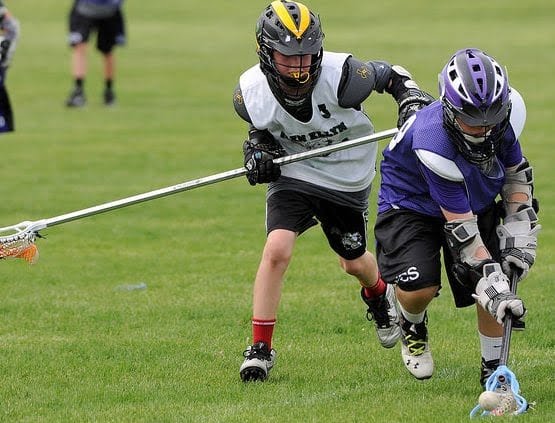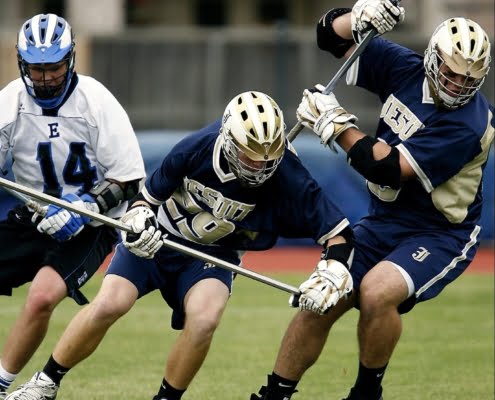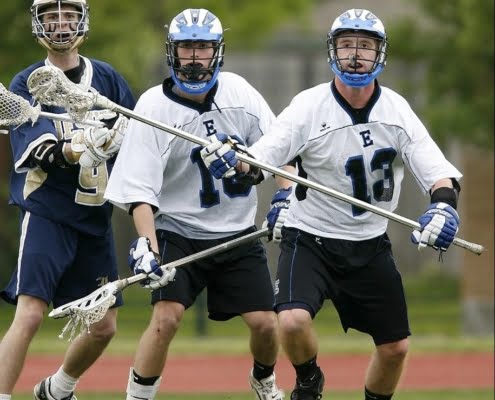Guest Post: Developing a Defensive Mindset
We are very lucky to have a guest contributor with tips for developing the mental aspects and attitudes of team sports that are huge contributors to your players' success. We hope you enjoy this as much as we do!
Anthony Lanzillo is a mental health professional with over 20 years experience. Lanzillo began writing about the mental game of sports in 2014 for such websites as FirstDown Playbook, Coaches Training Room, Lacrosse All-Stars, and Coaches Clipboard. He now reaches out and works with athletes as a mental skills coach. In 2012, Lanzillo served as the coordinator for the KBD LAX training program, and in 2013, he was a co-founder of the Haddon Township Lacrosse Club in Southern New Jersey which now sponsors a youth program, and boys' and girls' lacrosse at the high school level.
- Related: You can ready more about Anthony's work at www.thementalpeak.com
Developing A Defensive Mindset
Very often, when I am watching a high school boys’ lacrosse team play, I will see the defensive players struggling and even appear disengaged when the ball is at their end of the field, and at the same time, I look over and see the coaches on the sideline who are frustrated because their players are not doing what they were trained or instructed to do in the game. I will overhear the coaches talking about the players who are not communicating with their teammates, don’t have their sticks up, seem to be out of place, and appear to be anxious and having difficulty making quick decisions on the field.
I have often wondered why the defensive unit of the team, which has spent weeks and even months practicing and training for an upcoming game, seem to forget what to do or how to maintain their sense of composure and confidence.
I believe there is a mental skills training process that coaches can take their defensive players through which will give them a stronger defensive mindset, and thereby, put the defensive unit in a more proactive position, and make them more productive on the field. This all begins with helping your players decide on what they want. Let’s think about this.
When the defensive unit is on the field, they are told, and will tell themselves, that their main job is to not allow the other team to get a goal or score on them. On the surface, it makes perfect sense. Yet, the only problem with this “message” is that the players are mentally focusing on what they don’t want to do or have happen to them in a game.
By having the players think and worry about what they don’t want, these players are actually creating more anxiety and stress for themselves. While experiencing this anxiety and stress, some of these players will begin thinking and worrying about making mistakes, embarrassing themselves and looking bad. And then the players start second guessing themselves, hesitating in different game-time situations, and feeling like they are simply reacting to what is taking place right in front of them.
The training process begins by talking to your players who will be on the defensive unit about identifying and focusing on what they want to do or achieve. As their coach, you tell these players that their “mission” is to “shut them down”. Now, you may argue that there’s really no difference between instructing them not to let the other team score vs. to shut the other team’s offensive unit down.
Yet, the subtle difference in wording can have a significant impact upon how your players mentally prepare themselves to perform their roles in a game. Whereas, to not let the other team score is a "reactive mission statement”, to shut the other team down is a “proactive mission statement”. It’s all about how you mentally position your players to play and perform. Playing with a proactive mindset will give your defensive players more confidence, focus and a greater sense of composure.
With a proactive mission, the players will need a few “performance objectives”, which provide them with a mental framework where they can visualize and mentally rehearse how to carry out the defensive unit’s mission on the field in a game. If the defensive players’ mission is to shut the offensive unit of the opposing team down, then their three performance objectives are to “distract”, “disrupt” and “disarm” them.
And, after identifying their performance objectives, you will talk to your players about the various visual or verbal cues that they can use to reach these performance objectives. If the defensive player wants to distract his opponent on offense, then the defensive player needs to think about, and visualize, how he is going to use his body, his stick and his voice to distract the opposing player so that the other player can’t concentrate and keep his composure. Likewise, the defensive unit can think about how to disrupt the flow of the offensive unit and how to disarm the offensive unit by getting the ball on the ground or creating a turnover.
If you want your players on defense to play with a greater sense of purpose, the right perspective and presence of mind, then you must teach and train these players how to develop a strong defensive mindset. At each team practice, you want to make time to review the defensive unit’s proactive mission statement as well as the different performance objectives that will propel them to reach their mission.
The more that your players mentally rehearse their visual and verbal cues, are able to visualize and mentally review their performance objectives, and continue to reinforce in their minds that they are on the field to shut the other team down, you will begin to see your defensive unit playing with more intensity and perseverance.




